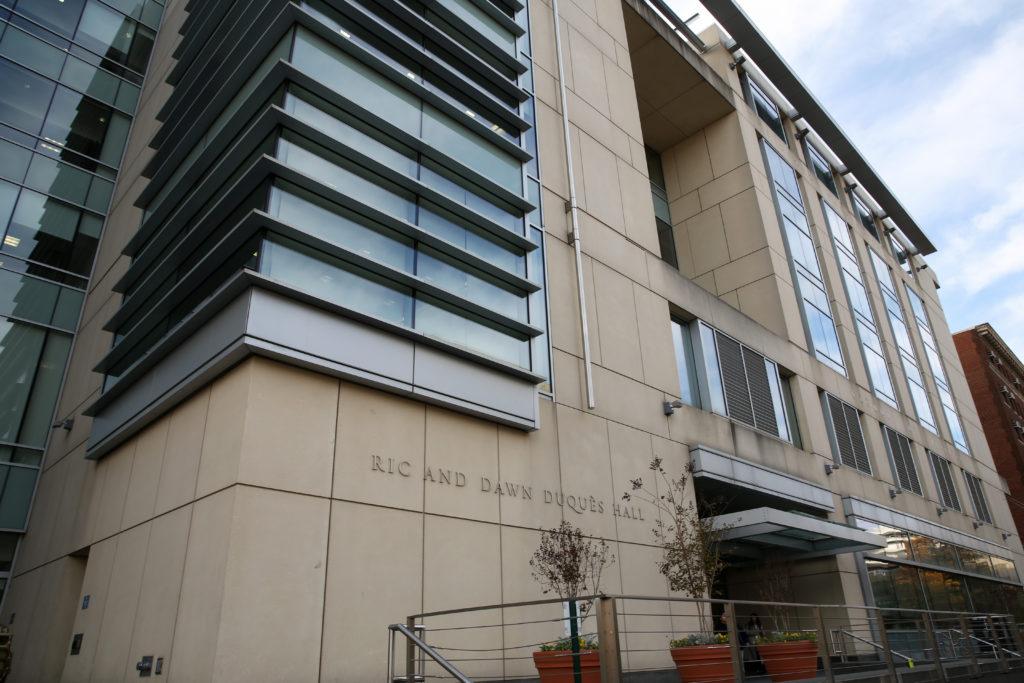Officials have filled a donor-funded professorship of business ethics in the School of Business after remaining vacant for seven years.
Kirsten Martin, the chair of the business school’s strategic management and public policy department, was chosen for the Lindner-Gambal Professorship in Business Ethics after Dean Anuj Mehrotra’s office approached her to fill the role, she said. Officials said the dean selected Martin for the fixed-term professorship in consultation with the position’s donors because of her extensive research in the field.
Vanessa Perry, the business school’s associate dean for faculty and research, said Martin was chosen for the position based on her contributions to the field of business ethics, like her work on the ethical implications of data privacy practices. She said Martin’s research has “shed light” on issues surrounding decision algorithms.
“Professor Martin is especially suited to serve in this capacity with her distinguished record of research, teaching and service,” she said in an email. “She is a well-known scholar in the field of business ethics, and a respected thought-leader on privacy and ethics in technology.”
The endowed professorship, which comes with funds for a professor to teach a course about business ethics, was established in 2004 by A. James Clark, a trustee who died in 2015, and named after two alumni, Thaddeus Lindner and Sergius Gambal, who graduated from GW in the 1950s. Tim Fort was the last professor to hold the endowed professorship, from 2005 to 2013.
“This professorship will enable her to further the integration of business ethics in our curriculum, especially as our courses include a greater emphasis on technology, analytics and artificial intelligence,” Perry said.
Fort did not return multiple requests for comment. He said last year that search committees might struggle to find a qualified candidate because the field of business ethics does not have any academic journals to recognize top scholars in the discipline.
For several years, business school officials failed to find a suitable replacement. Administrators cited difficulties locating a candidate with enough published research in the academic field of business ethics for the continued vacancy. Martin, a member of previous search committees, said officials were looking for candidates who were making independent contributions to the discipline, like giving keynote speeches on the topic.
Martin said her new position allows faculty and students to consult with her about issues in business ethics like technology and privacy in the workplace.
“There is a whole generation of consumers that are much more mindful of what they are doing and much more mindful about waste in the supply chain,” she said. “It is important for business schools to stay up to speed so they are speaking to what the students want to hear and also so that they are creating people that will enact the practices that actual consumers want.”
She said it can be difficult to navigate ethical issues after graduation while working for businesses and questions about avoiding mistakes arise often in the workplace.
“The hardest thing you’re going to face is not how to do a balance sheet – someone will help you with that,” Martin said. “The hardest thing is when you’re in a meeting and something is going wrong and you don’t know how to handle it.”
Martin said she plans to spearhead initiatives to educate students, faculty and the local D.C. community about issues surrounding corporate social responsibility and is planning to host a workshop covering artificial intelligence, ethics and governance sometime in the next academic year.
She added that her background working in coding for a large corporation before pursuing an academic career will help her better convey the discipline of business ethics to the wider public.
“It is easier as you move along to take something like an endowed chair where part of your job is translating the importance of your work and the importance of the field to external people and external stakeholders, if you have actually been out working,” she said. “I think that my background helps me translate the importance of the discipline to people who are not necessarily academic.”
Martin said her appointment to the position will enhance the reputation of the business school because failed searches to fill academic positions raise questions about the institution’s academic standing. She added that officials can now turn their attention to other issues within the business school to enhance the student academic experience.
“Every time there is a failed search there is a question of why,” she said. “There are many higher-ranked universities that have multiple failed searches for these types of positions because they are hard to fill. It’s hard to find people that are senior enough and that are doing a lot of research. But it still isn’t a great signal.”








